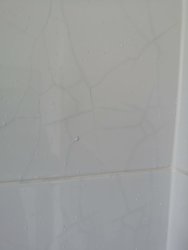T
Tile Shop
I currently have several ongoing customer issues that I am investigating where ceramic tiles are crazing within 1-2 weeks of installation. The constants in all cases are that a rapid-setting adhesive has been used and the tiles are BIII (Eb > 10%). I have sent the details and images to the Technical guys of the TTA to look into.
It's not temperature related (thermal expansion) as this has started to occur at different times of the year. We suspect that the rapid shrinkage and increase in tensile strength of rapid setting adhesive as it sets and cures are (in some cases) too strong for tiles with a lower density, modulus of rupture and breaking strength. This puts stress on the tile, causing random hairline cracks. The TTA is looking at each case and their chairman has agreed that further discussions on the subject will take place at their next technical committee meeting, so we will hopefully have an update soon.
Tile wise to name a few from past and present issues, I’ve had tiles from Lasselsberger, Ribasalbes, Porcelanosa, Fabresa, Salcamar, Recer, then the rapid set adhesives from Palace, Norcros, Tilemaster, Weber, BAL and Ultra. They can’t all be supplying faulty products that present identical issues, and its too much of a coincidence that the tiles have always been BIII (Eb > 10%) ceramics and the adhesive has always been rapid set.
I know many of you will never entertain using rapid-set on a wall, but for those that do, I would advise limiting it to use on porcelain tiles or flooring grade ceramics.
It's not temperature related (thermal expansion) as this has started to occur at different times of the year. We suspect that the rapid shrinkage and increase in tensile strength of rapid setting adhesive as it sets and cures are (in some cases) too strong for tiles with a lower density, modulus of rupture and breaking strength. This puts stress on the tile, causing random hairline cracks. The TTA is looking at each case and their chairman has agreed that further discussions on the subject will take place at their next technical committee meeting, so we will hopefully have an update soon.
Tile wise to name a few from past and present issues, I’ve had tiles from Lasselsberger, Ribasalbes, Porcelanosa, Fabresa, Salcamar, Recer, then the rapid set adhesives from Palace, Norcros, Tilemaster, Weber, BAL and Ultra. They can’t all be supplying faulty products that present identical issues, and its too much of a coincidence that the tiles have always been BIII (Eb > 10%) ceramics and the adhesive has always been rapid set.
I know many of you will never entertain using rapid-set on a wall, but for those that do, I would advise limiting it to use on porcelain tiles or flooring grade ceramics.



